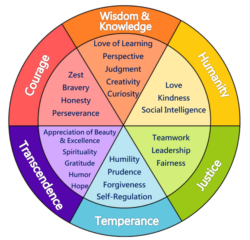Positive emotions (e.g. happiness, joy and gratitude) are vital for wellbeing and health1. Feeling good isn’t just a luxury, it’s an important part of thriving. Just like physical exercise is good for our health, mental exercises that boost positive emotions can help us decrease stress2, feel more resilient1, think and act more flexibly3, and feel more connected to others4. Positive emotions also improve our physical health, and may even help our immune system5! If you or your family are looking for a burst of good feelings—consider trying 1 of these 3 at-home exercises, which research suggests can increase positive emotions that may contribute to long-term thriving.
Activity 1: Take a gratitude walk6.
Timing:
15 minutes, 1-3 times a week
Step 1:
Go for a 10-minute walk! As you walk, think about:
- What good things you have in your life.
- What things you are grateful for.
- How the things you’re grateful for benefit you.
- Why you’re so grateful for them.
- If someone helped you, what it cost them (e.g. money, time, effort, etc.).
You might see something on your walk that you feel grateful for, or you could use this time to reflect on things you’ve felt grateful for recently. You may walk alone or near others (while also keeping your social distance). However, do not talk to others during this time. This should be a silent walk.
Step 2:
Reflect for 3-5 minutes by:
- Grabbing a notebook or your laptop.
- Taking 3-5 minutes to write a few of the things you thought about, that you felt grateful for. If you thought about someone who helped you, explain why it made you feel grateful to receive their help. That’s it!
Activity 2: Think about 3 funny things7.
Timing:
10 minutes, 1 week daily
How To:
Set 10 minutes aside every day to reflect on the on the 3 funniest things you saw, heard, or even participated in. Then write a little bit about each one. As you write, think about:
- What made these 3 things funny to you—that is, why did you think they were funny?
- How did this funny thing come about? What were the reasons that made this specifically funny?
These may feel like tricky questions, but there are no right or wrong answers here. Simply do your best to reflect on the experiences as YOU felt them. Also, try to pick a consistent time of day to reflect, such as the morning, your lunch break, or night-time.
Activity 3: Get stronger by using your strengths8.

Timing:
Varies, 1 week daily
Step 1:
Take a free, 15-20 minute quiz to tell you what your strengths are here.
Step 2:
(Time varies) Pick 1 of your top 5 strengths to use in a new way. For instance, if your strength is creativity, you might choose to apply this to cooking a new recipe. If your strength is having a love of learning, pick a new subject area to learn about, or learn more about a person you care about—whether it’s a neighbor or family member, especially as you may be around them more often than normal right now. Whatever your strength, find a way to apply it in a way you never have before.
A Last Bit of Advice
Just like in physical exercise where workout routines are tailored for different fitness levels, the same applies to positive emotion activities. Not everyone enjoys running or strength training, and not all positive emotion boosting activities will feel right for you. Try each of the activities mentioned above and find what feels best for you and your family. These activities are good for parents, grandparents, and youth. Feel free to mix up the timing. Do one activity twice a week and another once a week. Let each member of your family find what works for THEM. Consider yourselves on a journey to find the exercises and activities that bring each of you the most joy, contentment, happiness, gratitude, or whichever positive emotion best helps you and your family thrive. Good luck!
References
1. Tugade, M. M., & Fredrickson, B. L. (2004). Resilient individuals use positive emotions to bounce back from negative emotional experiences. Journal of personality and social psychology, 86(2), 320.
2. Gloria, Christian T., and Mary A. Steinhardt. “Relationships among positive emotions, coping, resilience and mental health.” Stress and Health 32.2 (2016): 145-156.
3. Kok, B. E., & Fredrickson, B. L. (2013). Positive emotion: How positive emotions broaden and build.
4 Kok, B. E., & Fredrickson, B. L. (2010). Upward spirals of the heart: Autonomic flexibility, as indexed by vagal tone, reciprocally and prospectively predicts positive emotions and social connectedness. Biological psychology, 85(3), 432-436.
5. Howell, R. T., Kern, M. L., & Lyubomirsky, S. (2007). Health benefits: Meta-analytically determining the impact of well-being on objective health outcomes. Health Psychology Review, 1(1), 83-136.
6. Bronk, K. C., Baumsteiger, R., Mangan, S., Riches, B., Dubon, V., Benavides, C., & Bono, G. (2019). Fostering purpose among young adults: Effective online interventions. Journal of Character Education, 15(2), 21-38.
7. Wellenzohn, S., Proyer, R. T., & Ruch, W. (2016). Humor-based online positive psychology interventions: A randomized placebo-controlled long-term trial. The Journal of Positive Psychology, 11(6), 584-594.
8. Linley, P. A., Nielsen, K. M., Gillett, R., & Biswas-Diener, R. (2010). Using signature strengths in pursuit of goals: Effects on goal progress, need satisfaction, and well-being, and implications for coaching psychologists. International Coaching Psychology Review, 5(1), 6-15.
Continue Exploring

Emotions
Can a Hug a Day Keep the Doctor Away?
You can get closer to those you care about with a little practice.

Joy
Dad Jokes: Science Agrees we Need More Laughter
Research shows that humor can ease stress during hard times. Dr. Susan Mangan shares 3 evidence-based practices to help us get started.

Meaning
Questions to Promote Love and Meaning
Thinking through paths out of anxiety and fear If it rings true for you that you need to train your brain to tone down anxiety and/or discover more about yourself – your sources of love and mattering, and your purposes – find a trusted friend or loved one or a small group and work through some of these questions together. Getting in touch with love: What are your fundamental beliefs about being loved–for just who you are? Not what you do, but just who you are now? Pause. Close your eyes, take 3 slow breaths–imagine God is looking…

